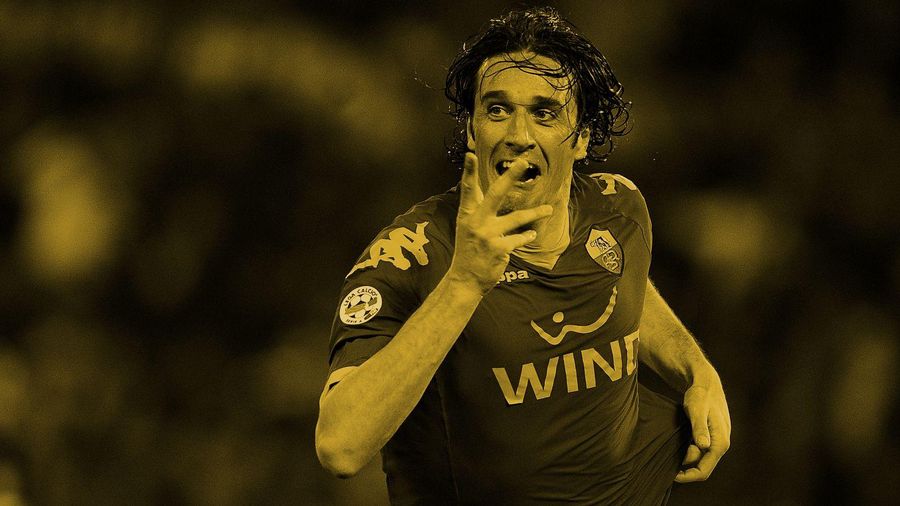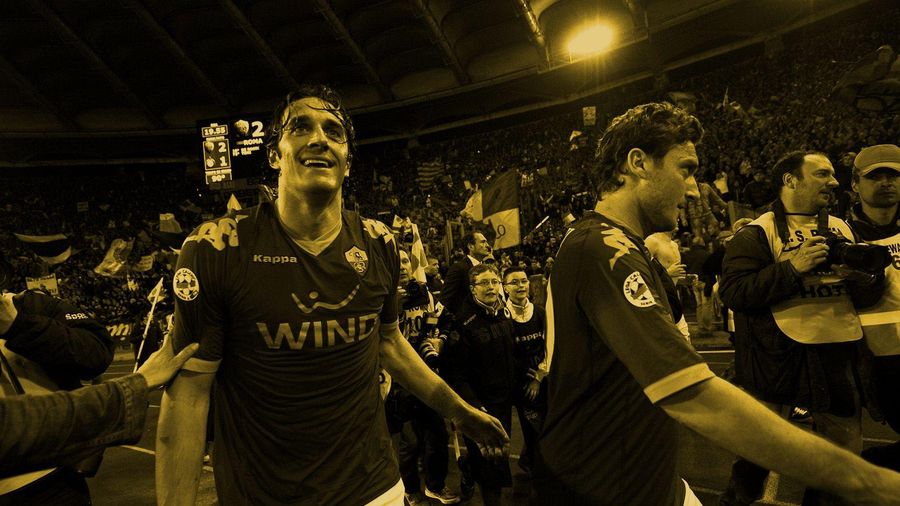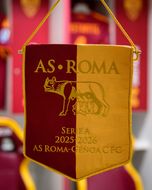

Luca Toni is now a retired football player. During his career he made at least three appearances for 16 teams - across three different countries – over the course of 22 years in the game. He certainly did not lack for experience.
In total, the lanky Italian striker made 568 appearances in his professional career, and celebrated the ball hitting the back of the net 268 times – often by cupping his fingers and then twisting his wrist around his ear, a move that became his trademark.
He always seemed to enjoy the sound of the fans cheering for a late bloomer who, besides turning into a great goalscorer, seemed to be a genuinely kind-hearted man. In a five-year spell for the national team he managed 16 goals in 47 appearances, along the way adding the 2006 World Cup to his trophy haul - on top of a Bundesliga and DFB Pokal with Bayern Munich, a Serie B title with Palermo, two Capocannoniere awards for top goalscorer in Serie A, and a UEFA Cup top scorer trophy too.
Amid all those achievements, he played just 2.6% of his total playing time at Roma and scored just 1.9% of his total career goals in the Italian capital. During the 2009-2010 season – where Toni spent the second half of the season at the Olimpico – Roma finished second, two points behind the treble-winning Inter; they were knocked out of the Europa League in the first knockout round, and they also lost the Coppa Italia final to Jose Mourinho’s side.
Compared to all he accomplished elsewhere, then, Toni’s time at Roma looks like a small footnote in a long, prosperous career, his most notable accolades coming in other colours.
But it is still an important and noteworthy note, regardless of the time involved. In the late 2000s and early 2010s, Roma were always a team crying out for a true striker (something that, even recently, the signing of Edin Dzeko was designed to address) and Toni became a key part of that search.
Consider how Serie A’s capocannoniere was distributed during that time:
- 2007-2008: Alessandro Del Piero, 21 goals
- 2008-2009: Zlatan Ibrahimovic, 25 goals
- 2009-2010: Antonio Di Natale, 29 goals
- 2010-2011: Di Natale, 28 goals
- 2011-2012: Ibrahimovic, 28 goals
Here’s Roma’s top scorer and the amount of goals they scored during each of those years:
- 2007-2008: Francesco Totti, 14 goals
- 2008-2009: Totti, 13 goals
- 2009-2010: Totti and Mirko Vucinic (tied), 14 goals each
- 2010-2011: Totti, 15 goals
- 2011-2012: Pablo Osvaldo, 11 goals
The issue here is evident: there was quite a gap between Roma’s top scorer and the league’s top scorer during this stretch. What became even more problematic was the sheer number of teams and players that all scored more goals than Roma’s top scorer, even behind the capocannoniere. For each of these seasons, at least five teams had a higher top scorer than Roma did, and at least five players scored more goals than Roma’s top scorer.
During some of these years, the difference was staggering; in 2011-12, 11 players scored more than Osvaldo, representing 11 different teams who had a higher goalscorer. In all of these seasons, Roma’s direct rivals all had a player that was either past the 20-goal mark or very near it – Juventus had two during the 2008-09 season (David Trezeguet and Del Piero) that surpassed that mark, and in 2010-2011 Inter and Napoli joined them with players that broke the 20-goal barrier.
That all speaks to the specific weakness that Toni was brought to Roma to help address. Totti is a marvelous footballer, and Mirko Vucinic was often crafty and decisive in the big games, but the side was crying out for a player that could consistently punish the smaller sides and distribute a larger quantity of goals throughout the season.
Roma’s duo were effective, but not battering rams; it speaks to Totti’s greatness but also the team’s structural deficiencies that the captain’s flair was not being used to distribute the ball and chip into the overall goal tally, but that he had to be used to be the team’s sole focal point both creatively and decisively.
32-year-old Toni, then, was brought in as a temporary answer to a number of long-standing questions: would a true No. 9 help Roma bridge the gap from nearly-men to Scudetto winners? Could the side function as well with a true poacher and hold-up man leading the line? What coach would make it work? What guile would be needed? Who and what would be sacrificed?
The results during that six-month stint were inconclusive. Five goals in fifteen appearances was not an obvious improvement on what Totti and Osvaldo managed during their tenures as the side’s leading scorers, but his slick goal against Inter demonstrated what the side were lacking – what the side was hoping for when a big man was brought in – and so nearly led the side to spoil Jose Mourinho’s party.
And that’s why Toni’s time at Roma, however brief, was more than a footnote in his career and Roma’s recent history. As short as his stay was, it acted as a prism – scattering light that revealed who he was as a player, how Serie A was at the time, and how Roma were trying to get all of the pieces together to turn ‘nearly’ into ‘finally.’

 Tickets
Tickets
 Shop
Shop






































